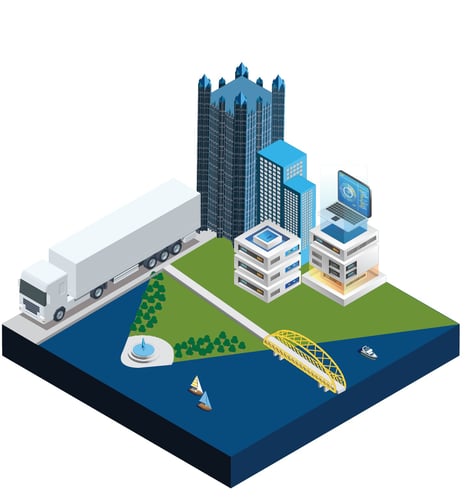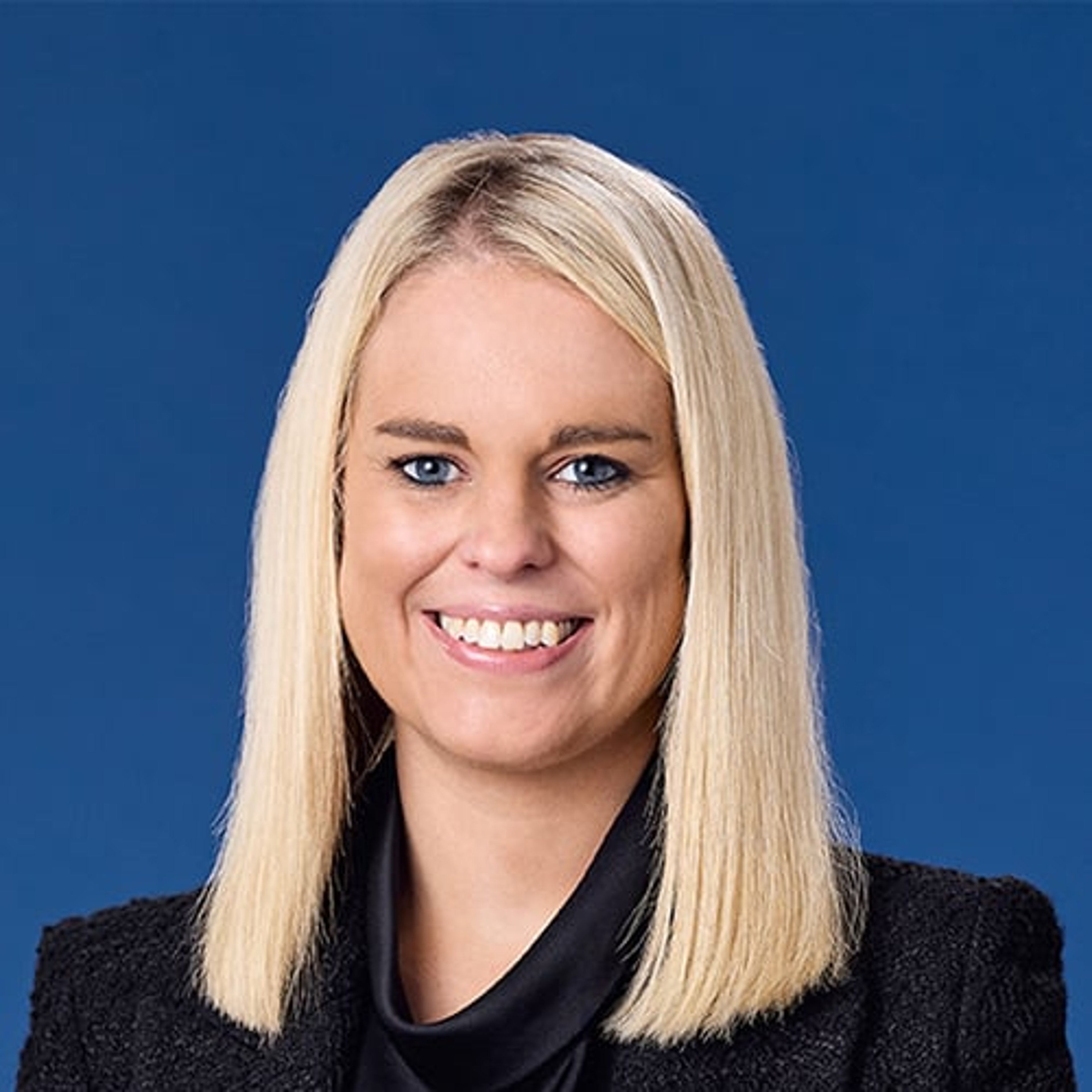Your capital may be at risk
Baillie Gifford’s hunt for transformational companies in the US continues to reach far beyond Silicon Valley, to include cities ranging from Boston to Houston, Pittsburgh to Salt Lake City.
“We aim to own the most ambitious and exceptional growth companies in the world, public or private,” says Claire Shaw. “As more technology clusters form across the country, these concentrations bring big benefits to portfolio businesses.”
Many transformative US companies are choosing to establish themselves in emerging, alternate hubs of innovation, far from northern California’s traditional tech industry.
Why? Shaw cites supportive regional “ecosystems” comprising university research centers, alert venture capitalists and appropriately skilled workers. When these factors are present, entrepreneurial ambition tends to thrive.

In some cases, the availability of pre-existing infrastructure is a powerful lure. Texas is a good example, as it has become a hub for green energy innovation despite recent partisan opposition within the state’s government.
In other cases, it’s quality of life that beckons. Compared to Silicon Valley, where the cost of a simple three-bedroom home can easily top $1.5m, many US cities look affordable. Lower state taxes and proximity to the outdoors add to the appeal.
Silicon Valley remains the red-hot center of hi-tech, Shaw cautions. But, as our map illustrates, the last decade has seen a blossoming of potentially world-changing businesses across the US.

Boston’s biotech cluster
Massachusetts contains many of the planet’s most innovative biotechnology companies. The state has overtaken California as the global leader in terms of job growth, investment and biotech infrastructure.
Cambridge-based Moderna, one of Baillie Gifford’s US Equity Growth holdings, hit the headlines during the pandemic when its mRNA-based vaccines helped lead the fightback against Covid-19. Now Moderna is repurposing the technology and using it as a platform to develop everything from better flu vaccines to personalized cancer vaccines.
“It applies a Silicon Valley mentality to the drug industry,” Shaw says. “It’s ‘coding’ genes and proteins like software to produce drugs for flu strains and latent viruses such as herpes, and it’s pursuing a personalized cancer vaccine based on the genetic sequencing of a tumor.”
Other notable northern US innovators include Insulet, a Boston-area company building insulin pumps for people with diabetes. “Its pump can be connected to continuous glucose monitors creating a closed-loop system almost like an artificial pancreas,” says Shaw. “Both types of diabetes are growing, which means more patients needing constant monitoring of their glucose. Insulet’s pumps can be connected to the monitors and help patients’ levels stay within a safe range.”

Texas’s climate hub
The modern petroleum industry began in Texas in 1901 so it’s fitting that the US oil boom’s birthplace should be helping to mitigate its long-term effects, with many businesses moving in and making it into a green energy innovation hub. Tesla’s gigafactory in Austin, opened in 2022, is a symbol of the state’s ability to attract manufacturers.
Texas is attracting some of the world’s leading companies in “cleantech,” thanks to strong universities, ample venture capital and highly trained energy workers whose skills are easily transferable from oil and gas.
Houston-based Solugen is working to decarbonize the chemicals industry, a major CO2 emitter. It’s replacing the fossil-fuel “feedstock” found in cleaning products, fertilizers and concrete with sustainable alternatives such as corn sugar and biomass.
The world leader in carbon capture technology Climeworks takes a more direct approach. The Swiss-based company recently made state capital Austin its US base. Its technology sucks CO2 out of the air and stores it deep underground. “It’s a negative emissions technology,” Shaw says. “It’s based on the assumption that abatement by itself is not enough.” She cites the Biden administration’s $1.2bn support for a south Texas direct air capture hub, with the promise of thousands of new jobs.

Pittsburgh’s robotics row
A half-century ago, Pittsburgh was famed for its steel. Today, the Rust Belt city has a reputation for research into self-driving technology, with a cluster of autonomous vehicle (AV) firms benefiting from the supportive environment.
Much of the credit for this transformation goes to Carnegie Mellon University. It had the foresight to start a robotics institute in 1979, when self-driving vehicles and AI chatbots were still science fiction.
Supported by local government, the university helped spawn a Pittsburgh neighborhood dubbed Robotics Row, which is packed with AV startups and research labs.
One resident is Aurora Innovation, founded by former Uber and Tesla engineers and led by chief executive, Chris Urmson, former leader of Google’s self-driving car program and a Carnegie Mellon alumnus. Aurora develops software to drive trucks on highways, promising a more efficient transport network.
“The trucking industry has cult status in the US but has trouble attracting drivers in a tight labor market,” Shaw says. “They’re a really interesting company in that they’re not trying to develop the vehicles; they develop the software then partner with truck companies such as Volvo and DAF Trucks parent, PACCAR.”
Utah’s silicon slopes
Salt Lake City ranked as the hottest jobs market in the United States in 2023, according to the Wall Street Journal. Utah’s booming tech sector can take much of the credit.
What makes the state so attractive? Affordable homes and access to the great outdoors help. So too do friendly business laws, tax incentives and readily available land for construction, according to the newspaper. Such selling points have helped make Salt Lake City and the next-door city of Lehi, known as Silicon Slopes, a magnet for tech companies.
Recursion Pharmaceuticals is a company aiming to use machine learning to industrialize drug discovery. “They’re running millions of miniaturized experiments based on cell analysis that would take a PhD student years and do it in a fraction of the time,” says Shaw.
Attracting talent to Utah is not a problem. Shaw recounts how Recursion’s chief executive, Christopher Gibson, has described the ease of drawing workers to the state: “He told us that if you create an incredible culture and an incredible company, you can recruit and retain people from all around the world. That’s exactly what Recursion has done.”
Risk factors
The views expressed should not be considered as advice or a recommendation to buy, sell or hold a particular investment. They reflect opinion and should not be taken as statements of fact nor should any reliance be placed on them when making investment decisions.
This communication was produced and approved in September 2024 and has not been updated subsequently. It represents views held at the time of writing and may not reflect current thinking.
Potential for profit and loss
All investment strategies have the potential for profit and loss, your or your clients’ capital may be at risk. Past performance is not a guide to future returns.
This communication contains information on investments which does not constitute independent research. Accordingly, it is not subject to the protections afforded to independent research and Baillie Gifford and its staff may have dealt in the investments concerned.
All information is sourced from Baillie Gifford & Co and is current unless otherwise stated.
The images used in this communication are for illustrative purposes only.
Important Information
Baillie Gifford & Co and Baillie Gifford & Co Limited are authorised and regulated by the Financial Conduct Authority (FCA). Baillie Gifford & Co Limited is an Authorised Corporate Director of OEICs.
Baillie Gifford Overseas Limited provides investment management and advisory services to non-UK Professional/Institutional clients only. Baillie Gifford Overseas Limited is wholly owned by Baillie Gifford & Co. Baillie Gifford & Co and Baillie Gifford Overseas Limited are authorised and regulated by the FCA in the UK.
Persons resident or domiciled outside the UK should consult with their professional advisers as to whether they require any governmental or other consents in order to enable them to invest, and with their tax advisers for advice relevant to their own particular circumstances.
Baillie Gifford International LLC is wholly owned by Baillie Gifford Overseas Limited; it was formed in Delaware in 2005 and is registered with the SEC. It is the legal entity through which Baillie Gifford Overseas Limited provides client service and marketing functions in North America. Baillie Gifford Overseas Limited is registered with the SEC in the United States of America.
116554 10050129


